Iran Blames NATO For Escalation In Ukraine Crisis
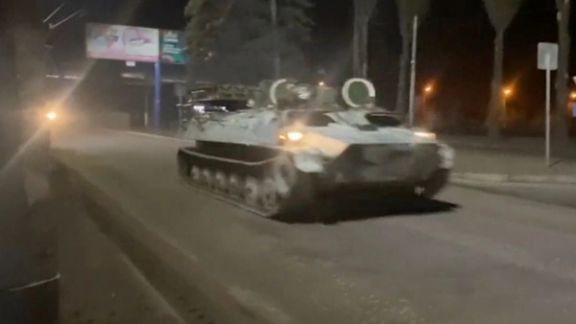
Iran has blamed NATO for the recent escalation in the Ukraine crisis, calling for restraint from both sides, as Russia has moved to dismember the country.

Iran has blamed NATO for the recent escalation in the Ukraine crisis, calling for restraint from both sides, as Russia has moved to dismember the country.
Foreign Ministry spokesman Saeed Khatibzadeh said on Tuesday that provocative measures and interventions by the United States led to drastic escalation of tensions.
"Unfortunately, NATO's provocative measures and interventions, led by the US, have further complicated the situation in the region”, he said.
The Islamic Republic is monitoring the developments with sensitivity and urges all sides of the conflict to exercise restraint and avoid any actions that could aggravate the tensions, Khatibzadeh said.
President Vladimir Putin announced late Monday that Russia recognized the independence of two breakaway regions of Donetsk and Lugansk in eastern Ukraine held by separatists, practically paving the way for the deployment of Russian troops.
Hours after Putin’s move, Ukrainian President Volodymyr Zelenskyy said his countrymen “are not afraid” announcing that it would deploy troops there to “maintain peace”.
The decision by Moscow has triggered international condemnation and a promise of targeted sanctions and a promise of targeted by the United States and the European Union.
An urgent meeting of the United Nations Security Council (UNSC) was held on the deepening crisis as the United States said the announcement by Putin was an “unprovoked violation of Ukraine’s sovereignty and territorial integrity”.
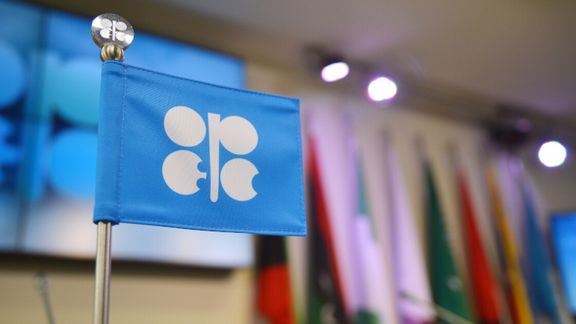
There is no need for OPEC+ to expand its oil production, Nigeria's petroleum minister said on Tuesday, as the group sees a potential deal between Iran and world powers unlocking more supplies.
"We don't have do anything extraordinary this time because we are expecting a lot of production," Timipre Sylva said on the sidelines of a gas exporters conference in Qatar's capital Doha.
OPEC+ cut supplies in 2020 as the COVID pandemic reduced global demand but began marginally increasing supplies. However overall production has remained well below pre-pandemic levels bossting prices to 7-year highs of close to $100 per barresl.
"We are expecting more production if a nuclear deal with Iran works out (since) there will be production from them," Sylva added.
Months of indirect talks between Iran and the United States to revive a 2015 nuclear deal abandoned in 2018 by then-US President Donald Trump are in their final stage, diplomats have been saying, although some still believe major issues remain to be resolved.
A deal could pave the way for OPEC member Iran to raise its oil exports further, helping to ease what many analysts see as an acute tightness in the oil market.
Brent crude traded just below $100 a barrel on Tuesday, its highest since September 2014, as the possibility of a Russian invasion of Ukraine heightened the risk of supply disruptions.

In tweets, Mostafa Arani, chief editor of 7Sobh newspaper has said Iranian authorities are restricting bandwidth and slowing broadband as a means of censorship.
Arani has warned of a plunge in the rate of data transfer (bandwidth) allocated to Instagram, the only major social media platform not filtered, and a reduced general speed of mobile and fixed broadband.
According to Arani, an expert in informational technology, reduced bandwidth slows access to Instagram, by prolonging the ping time and preventing the page to load as if blocked. Instagram, owned by Meta platforms, formerly called Facebook, has over 47 million users in Iran.
On Monday check-host.net data showed a ping server time of 85.4 milliseconds (ms) for Instagram from IP addresses in Tehran, 16.5 ms from Istanbul, 1.0 ms from Paris, and 54.4 ms from Karaganda, Kazakhstan.
Unlike Instagram, WhatsApp messaging applications is filtered but nearly every Iranian with a smartphone has installed anti-filtering software that allows access to filtered applications and websites. Anti-filtering software, however, will time out if the internet speed is low. Nonetheless, with over 50 million users, WhatsApp is the most popular messaging and social media platform in Iran.
Shargh, the reformist newspaper, said Monday its investigation showed serious disruption in Instagram traffic over two months. According to Shargh, the disruption happened every day after 5:00 pm – which would make Instagram obsolete if continued.
World Speedtest rankings
Iran now ranks 77th, two places behind Israel, six behind Ireland, and two ahead of Ethiopia in the Speedtest Global Index for mobile internet. Fixed broadband speed is 141st, almost at the same level as Benin, the Western Sahara, and Nigeria, while 18 places ahead of Lebanon, which has suffered years of civil war and instability. Afghanistan was last of 179 countries in the list.
Two months ago Iran ranked 70th in mobile internet speed and it has dropped by 7 points. Social media users complain that the speed of mobile internet and fixed broadband has dropped and their access to social media and messaging applications has noticeably diminished in the past few weeks.
Some businesses relying on Instagram now say they fear bankruptcy, with online meetings impossible despite the Covid pandemic. Taxis and cars are getting lost because their GPS devices fail to function. Students who have to study online, with classes and exams disrupted, are frustrated.
Maryam Shokrani, journalist with 23,000 Instagram followers, shared a screenshot on Twitter Monday flashing "Session not found" as an example of how her online activities were curtailed.
"We are kicked out of online sessions all the time, the sound comes and goes, and at the end we don't know what happens in the session,” she wrote. “Now the minister of communications, Isa Zarepour, says those who complain about low speed are making a fuss!"
"The clandestine filtering of Instagram and WhatsApp through gradual reduction of bandwidth is much more unethical than official filtering because it is a sign of deceit, weakness, irresponsibility," Roozbeh Alamdari, editor of Jamaran, a reformist news website, tweeted Monday.
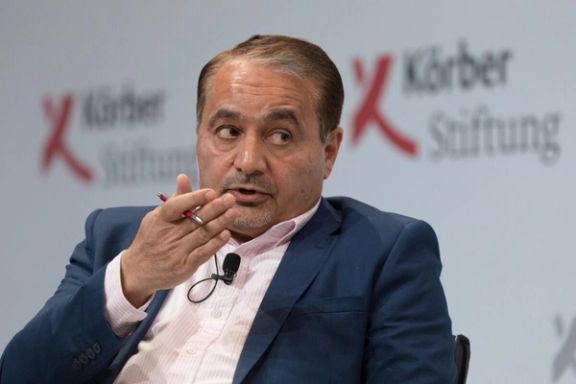
A former Iranian diplomat who is currently a Princeton University scholar has been sentenced to 11 months in prison over his role in a corruption case in Iran.
Iranian Judiciary Spokesman Zabihollah Khodayian said on Monday Hossein Mousavian was an advisor in a €2-billion case in the Persian Gulf island of Kish in the 2000s.
According to Khodayian, Mousavian brokered a deal to give 200 hectares of the island and 100 thousand square meters of its territorial waters to a third party but the resort project was never carried out.
Earlier in January, his remarks in a documentary to mark Qasem Soleimani’s second death anniversary led to controversy when he gloated about how Iran’s threat to avenge Soleimani killing frightened the wife of Brian Hook, Washington’s special envoy for Iran at the time.
Advocacy group United Against Nuclear Iran (UANI) has also called on Princeton “to dismiss him from any association or affiliation with the university without delay”, noting that “Mousavian’s affiliation with Princeton is a stain on the university’s reputation and credibility”.
UANI described him as “an agent of the Iranian regime” who is currently employed as a Middle East and nuclear policy specialist at the university.
Late in December, an American academic who was imprisoned in Iran for 1,216 days, said Mousavian is sympathetic to the Iranian regime, claiming that he stymied efforts to free him from prison.
Mousavian, who traveled to Iran to attend the funeral service of Soleimani, was Tehran’s ambassador to Germany when four Iranian dissidents were assassinated at Berlin's Mykonos restaurant in 1992.
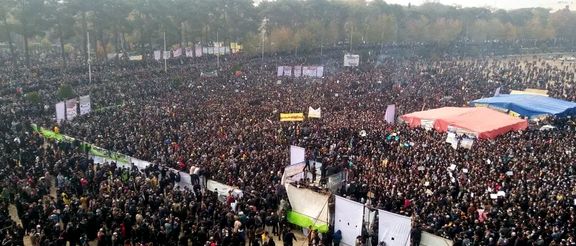
Eleven Iranian opposition groups have urged three European nations participating in nuclear talks with Iran to stop the negotiations with the Islamic Republic.
The letter, which was signed by Western-based secular and liberal groups opposed to the Islamic Republic, addressed the leaders of France, Germany, and the United Kingdom, calling on them to end “the failed and catastrophic policy of negotiating with and appeasing the Islamic Republic”.
They told Emmanuel Macron, Boris Johnson, and Olaf Scholz that the regime with which they are engaged in talks “is the same fundamentalist regime that since its inception 43 years ago, has had terror, hostage-taking, and sabotage, as an integral part of its ideology and nature, and its most important tools for blackmailing the free world”.
Diplomats have said that nuclear talks, which began last April to revive the 2015 nuclear agreement (JCPOA), have made significant progress and a final deal is imminent soon. In case agreement is reached, Iran is set to receive billions of dollars of blocked funds and massive sanctions relief.
The signatories highlighted that the “Islamist revolutionary regime has carried out hundreds of terrorist attacks around world”, emphasizing that it has engaged in killings, bombings, and hostage taking, as well as issuing fatwas (decrees) for murder of innocent people.
This is “the same inhumane, misogynist, and anti-LGBTQ oppressive regime that, despite decades of attempts at dialogue and resolutions by the international community, still enforces medieval Sharia law,” which includes stoning, amputation, and flogging, the letter read.
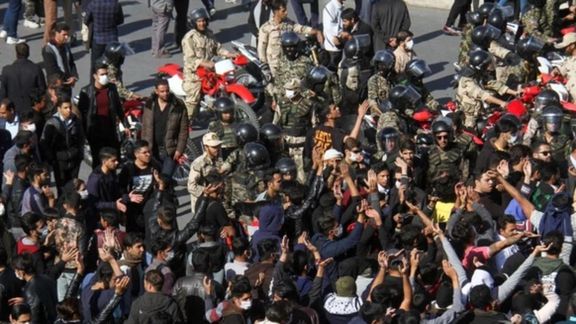
The opposition groups stressed that the clerical government “carries out large-scale executions and imprisonments, often with the aim of suppressing and silencing political opponents”.
The Islamic Republic soon after its establishment cracked down on opposition and independent groups and has continued to ban civil society initiatives. Practically all opposition has been sent into exile or imprisoned.
They criticized the policy of the West, especially Europe, towards “this anti-Semitic regime,” saying “appeasement and the payment of ransoms in order to normalize and attempt to change the behavior of this inherently abnormal regime” have only emboldened it “in its terrorist activities, criminality, and nuclear and military ambitions”.
The signatories highlighted Iran’s track record of “insolence on the international stage and criminal suppression of the people”, stating that “Nearly two decades of counterproductive negotiations and flawed deals such as the JCPOA have only given the Islamic Republic a chance to buy time. By deceiving the international community, it has brought its nuclear and ballistic missile programs to an irreversible stage”.
Then opposition groups called for action, urging the three European powers “to put aside, once and for all, the failed and catastrophic policy of negotiating”, saying that now when the Islamic Republic is at the lowest level of popular legitimacy in its history it “is the time to choose another policy: Maximum support for the Iranian people to end more than four decades of medieval rule and replace it with a secular democratic system that serves Iran's national interests through peaceful coexistence and cooperation with neighbors and all countries in the world”.
“This is the only way to prevent the world's largest terrorist state from achieving the atomic bomb -- a catastrophe that will plunge the entire region into a nuclear arms race”, they wrote.
They asked the European leaders that instead of the Vienna talks they should “enter into a serious and effective dialogue with the democratic and national opposition of Iran, which wants a free and secular Iran”.
“Sooner or later, the Islamic Republic will be overthrown by the brave and courageous people of Iran, and the day after liberation, the Iranian people will remember who stood by them in difficult times and who aided their oppressors”, they concluded.
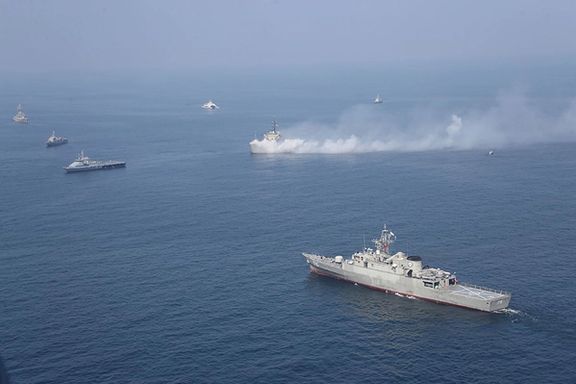
The US Navy's 5th Fleet has announced the launch of a joint force of drone boats with allies to patrol Mideast's volatile waters as tensions simmer with Iran.
Vice Adm. Brad Cooper, who leads the 5th Fleet, told The Associated Press that 100 unmanned drones, both sailing and submersible, would dramatically multiply the surveillance capacities of the US Navy, allowing it to keep a close eye on waters critical to the flow of the global oil and shipping.
Trade at sea has been targeted in recent years as Tehran's nuclear deal with world powers collapsed.
"By using unmanned systems, we can just simply see more. They're high-reliability and remove the human factor," Cooper said on the sidelines of a defense exhibition in Abu Dhabi, adding the systems are "the only way to cover on whatever gaps that we have today."
Cooper said he hopes the drone force would be operational by the summer of 2023 to put more "eyes and ears on the water."
The Bahrain-based 5th Fleet includes the crucial Strait of Hormuz, the narrow mouth of the Persian Gulf through which 20% of all oil passes.
It also stretches as far as the Red Sea reaches near the Suez Canal, the waterway in Egypt linking the Mideast to the Mediterranean, and the Bab el-Mandeb Strait off Yemen.
The high seas have witnessed a series of assaults and escalations in recent years, following former President Donald Trump's decision to pull the United States out of the nuclear deal and reimpose devastating sanctions on Iran.
A maritime shadow war has played out as oil tankers have been seized by Iranian forces and suspicious explosions have struck vessels in the region, including those linked to Israeli and Western firms.
Iran has denied involvement in the attacks, despite evidence from the West to the contrary.
"It's been well-established that Iran is the is the number one and the primary regional threat we are addressing," Cooper said.
Iran sponsors proxy militias in Iraq, Syria, Lebanon and Yemen that give it a military reach across the region.
As Yemen's 7-year-old civil war grinds on, the Iran-backed Houthi rebels have dispatched bomb-laden drone boats toward Saudi waters that have damaged vessels and oil facilities.
There have also been a recent string of tense encounters between Iranian and American naval boats in the Mideast waters.
The confrontations have underscored the risk of an armed clash between the nations.
Notably, however, Cooper said the US has not seen such an episode in the past few months, as diplomats in Vienna attempt to resuscitate the tattered atomic accord.
"If you look back over the last couple of months, I would say it's status quo," Cooper said.
"There have been some periods where they have had an uptick in activity... we certainly call that out, but lately it's been status quo," he added.
Iran's mission to the United Nations did not immediately respond to a request for comment.
The shared threat of Iran has prompted a rapid realignment of politics in the Middle East.
In 2020, the United Arab Emirates and Bahrain normalized ties with Israel in a series of US-brokered accords.
Those warm relations have even extended into a form of military diplomacy.
Israel for the first time joined in a massive US-led naval exercise in the region earlier this month, publicly participating alongside other Gulf Arab states with which it has no relations, including Saudi Arabia.
Cooper said that Israel likely would join in the Navy's unmanned naval drone task force in the region.
"I would expect exercises in the future where we would work side by side," he said.
AP report